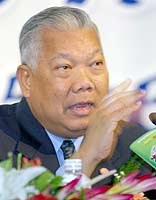Embattled Thai premier vows to work on
Bangkok -  Embattled Thai Prime Minister Samak Sundaravej on Sunday vowed to stay on with his job even though his office has been surrounded by thousands of protestors calling for his resignation.
Embattled Thai Prime Minister Samak Sundaravej on Sunday vowed to stay on with his job even though his office has been surrounded by thousands of protestors calling for his resignation.
"On Monday I will go to work at Government House and there will be no problem getting in," said Samak, addressing his weekly "Talking Samak-Style" television program.
On Friday more than 10,000 anti-government protestors broke through police barricades to essentially lay siege to government House, the seat of the government and Samak's office, to demand the resignation of the entire cabinet.
In a reversal of tactics, Samak has allowed a public grilling of his cabinet's performance by the Senate on Monday and a no-confidence motion by the opposition on Tuesday, seen as a means of defusing the demonstration's fire through parliamentary means.
Samak had opposed the censure debates before Friday.
Samak, a veteran right-wing politician who has been linked to several bloody crackdowns on pro-democracy demonstrations in Thailand's recent history, highlighted that his was an elected government said the demonstrators had no right to call for its disbandment.
"When it reaches the point that people cannot put up with the situation any more, I will do my duty," Samak warned, in reference to the anti-government demonstration that has occupied the heart of the administration and vowed to stay put until the cabinet resigns.
So far, the demonstration have been peaceful and the government has refrained from confrontation, perhaps because it is uncertain of the Thai military's backing.
Samak leads the People Power Party that won the most votes in the December 23, 2007 general election. The party campaigned on a platform of returning the populist policies of coup-ousted premier Thaksin Shinawatra, a billionaire politician who is deemed its chief financier and the main political backer of Samak.
The anti-Samak demonstration is led by the People's Alliance for Democracy, the same coalition of disparate non-partisan groups that organized mass protests against Thaksin in 2006.
Thaksin was ultimately overthrown by a military coup on September 19, 2006, but the PAD is now back on the streets because they feel Samak and his cabinet are just "nominees" for the ousted Thaksin clique.
The PAD first took to the streets again on May 25 when the cabinet started to push for constitutional amendments that might lead to the derailing of several pending corruption cases against Thaksin and his eventual return to power.
Thaksin and 110 leading members of his now defunct Thai Rak Thai Party, which dominated Thai politics between 2001 to 2006 after introducing a host of populist policies that clinched the votes of Thailand's poor, were banned from politics for five years by a military-appointed Constitutional Tribunal's ruling on May 30, 2007.
Thaksin, who remained in exile while Thailand was under a military-appointed interim government in 2007, returned to Thailand only after Samak had set up a coalition government in February.
He is facing at least one abuse-of-power charge for a purchase of land by his wife at a government auction in 2003 when he was premier, and there are about 16 corruption cases pending against him.
Thaksin, who made his fortune from government telecommunications concessions, has become a divisive figure in Thailand's political landscape, pitting his style of democratically elected populist patronage against the Bangkok-based middle class and elite, who distrust his self-serving tendancies. (dpa)